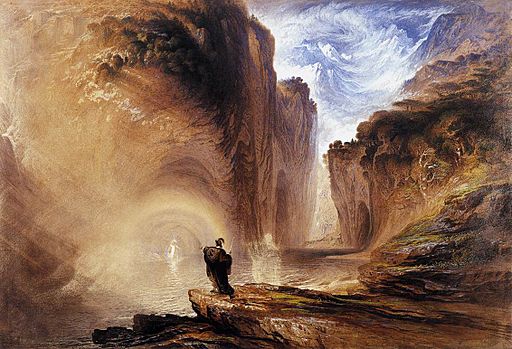 |
| Manfred and the Alpine Witch by John Martin |
McLuhan saw Sherlock Holmes as a sign of the collapse of Western Man and said you could basically draw a line from Byron through Nietzsche to Holmes in this collapse. I have to double check, but I think Darwin and Kipling were in there, too.
Anyways, it's interesting to me that we are in many ways trying to reverse the effects of mankind's modern and postmodern self-image, and that in doing so, we're using a distortion of the trope of the Byronic hero. Arthur White is an opposite of Byron's Manfred. Will is the opposite of Don Juan. From our vantage point of middle age, we're standing against the culture not with heightened versions of ourselves, but deeply flawed and broken ones. Nietzsche takes from Byron the notion of making art out of one's life. We seem to be about wheezing what life we can into art.
Byron never made it to middle age. I wonder what the middle-aged Byronic hero would look like.
The Byronic hero is also a vital to American identity (the concept of the self-made man) and rock and roll (the notion of self-mythologizing: Bo Diddley, Little Richard, Mick Jagger, Jim Morrison, Alice Cooper, David Bowie, etc).
Stan Witkowski is a Pharisee in the Church of the Self-Made Man and Will strives to be. Will also tries to push Arthur down the path of self-mythology, although for obvious reasons, it's a dumb strategy. Will looks at Arthur and sees a blank slate for a rockstar identity, but Arthur is far from a blank slate--he's an incomprehensible slate.
Will is actually the blank slate: he has no understanding of who he is because he thinks that an identity must be achieved. Every time he is on the verge of success, he very nearly becomes a person.
Every time Arthur flops, he unknowingly murders Will!
I've never made this connection, perhaps because I'm too close to my own name (it means "protector," so I've seen Will as Arthur's protector), but really, Will is thwarted Nietzschean will. Adolf Hitler, robbed of success, kills himself because he is nothing without conquest: the will to power is hopeless when power is out of reach. Ironically, the Happy Lomans or Larry Hitlers of the world, if you will, can be fairly happy because the promise of power never evades them--just the power itself--so the will continues. In his middle age, Will retreats to that Keith Richards sort of look because it reminds him of days when the promise of power still provided an object to his will/Will.
Arthur on the other hand has an identity so profound that it bewilders even him. I think I see him in his elderly years as a pillar saint. I'd like to take him way, way out of our contemporary understanding of saints. When was the last time the church named a pillar saint? They popped up in the ruins of the Roman Empire, more or less after the martyrs.
Maybe it's time, as Western culture lies in ruins, that we re-encounter the pillar saint.
No comments:
Post a Comment